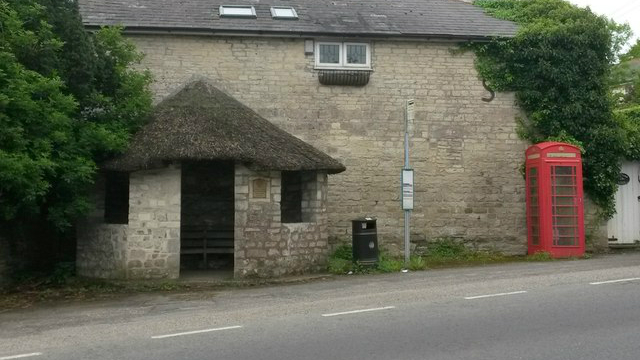Dorset bus shelter becomes listed building
Historic England has also awarded protected status to cattle trough and a giant cockerel

A free daily email with the biggest news stories of the day – and the best features from TheWeek.com
You are now subscribed
Your newsletter sign-up was successful
A Dorset bus shelter with a thatched roof has gained listed status, amid a push to celebrate more “modest” structures of community life.
The shelter, in the West Dorset village of Osmington, was built in the late 1940s by Harry and Ethel Parry-Jones, and doubles as a memorial to their son David, who was killed in the Battle of Normandy in 1944.
Historic England, the organisation that administers listed statuses, said the simple stone hut made the grade because it had “not been significantly altered since it was built”, adding: “It demonstrates that even modest and functional structures can form eloquent and valuable memorials for their local communities.”
The Week
Escape your echo chamber. Get the facts behind the news, plus analysis from multiple perspectives.

Sign up for The Week's Free Newsletters
From our morning news briefing to a weekly Good News Newsletter, get the best of The Week delivered directly to your inbox.
From our morning news briefing to a weekly Good News Newsletter, get the best of The Week delivered directly to your inbox.
Explaining the specific reasons why the shelter, on the A353, has been listed as Grade II, a statement on the Historic England website says: “Historic interest: An eloquent witness to the impact of world events on this community. Architectural interest: Its use of materials, reflecting local vernacular building traditions of Purbeck stone and thatch, which complements its surroundings.”
The shelter is one of 23 “remarkable” or “unusual” buildings and sites of a total 952 given new or upgraded protection by the organisation this year, The Daily Telegraph reports.
The Guardian notes that among the more unusual choices are a 1916 cattle and horse trough in Hampstead, North London; a railway station that closed to passengers 60 years ago, Otterington, in Yorkshire; and a big metal cockerel set atop an old pub sign on Sutton High Street, in south London.
Duncan Wilson, chief executive of Historic England, said that protected statuses was an important tool in preserving and celebrating the country’s heritage.
A free daily email with the biggest news stories of the day – and the best features from TheWeek.com
“We encourage people to understand and enjoy the wonderful range of historic places on their own doorsteps and by listing them we are protecting them for future generations,” he said.
Heritage Minister Michael Ellis said: “Our historic buildings and places help us to make sense of our past and to understand the world we live in today.
“Protecting our heritage ensures that future generations can enjoy, and learn about, our rich history and I am pleased to see that a large number of important places have been added to the National Heritage List in 2018.”
-
 The ‘ravenous’ demand for Cornish minerals
The ‘ravenous’ demand for Cornish mineralsUnder the Radar Growing need for critical minerals to power tech has intensified ‘appetite’ for lithium, which could be a ‘huge boon’ for local economy
-
 Why are election experts taking Trump’s midterm threats seriously?
Why are election experts taking Trump’s midterm threats seriously?IN THE SPOTLIGHT As the president muses about polling place deployments and a centralized electoral system aimed at one-party control, lawmakers are taking this administration at its word
-
 ‘Restaurateurs have become millionaires’
‘Restaurateurs have become millionaires’Instant Opinion Opinion, comment and editorials of the day
-
 Home Office worker accused of spiking mistress’s drink with abortion drug
Home Office worker accused of spiking mistress’s drink with abortion drugSpeed Read Darren Burke had failed to convince his girlfriend to terminate pregnancy
-
 In hock to Moscow: exploring Germany’s woeful energy policy
In hock to Moscow: exploring Germany’s woeful energy policySpeed Read Don’t expect Berlin to wean itself off Russian gas any time soon
-
 Were Covid restrictions dropped too soon?
Were Covid restrictions dropped too soon?Speed Read ‘Living with Covid’ is already proving problematic – just look at the travel chaos this week
-
 Inclusive Britain: a new strategy for tackling racism in the UK
Inclusive Britain: a new strategy for tackling racism in the UKSpeed Read Government has revealed action plan setting out 74 steps that ministers will take
-
 Sandy Hook families vs. Remington: a small victory over the gunmakers
Sandy Hook families vs. Remington: a small victory over the gunmakersSpeed Read Last week the families settled a lawsuit for $73m against the manufacturer
-
 Farmers vs. walkers: the battle over ‘Britain’s green and pleasant land’
Farmers vs. walkers: the battle over ‘Britain’s green and pleasant land’Speed Read Updated Countryside Code tells farmers: ‘be nice, say hello, share the space’
-
 Motherhood: why are we putting it off?
Motherhood: why are we putting it off?Speed Read Stats show around 50% of women in England and Wales now don’t have children by 30
-
 Anti-Semitism in America: a case of double standards?
Anti-Semitism in America: a case of double standards?Speed Read Officials were strikingly reluctant to link Texas synagogue attack to anti-Semitism